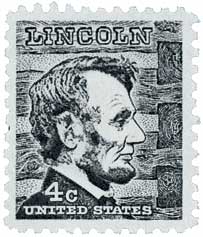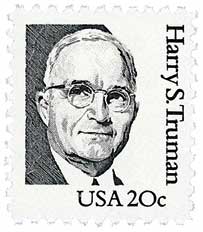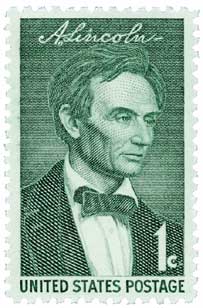
1958-59 1¢ Abraham Lincoln
City: Hodgenville, Kentucky
Quantity: 120,400,200
Printed by: Bureau of Engraving and Printing
Printing Method: Rotary Press
Perforations: 10 ½ x 11
Color: Green
Postmaster Lincoln
In 1831, 22-year-old Lincoln joined with a couple of friends in floating a flatboat down the Sangamon River to New Orleans. He was working as a bow hand, ferrying surplus farm products to the South.

Along the way, the boat got stuck on a milldam near New Salem, Illinois. A crowd of people gathered by the water to watch the men free their boat. Some took notice of the tall, thin man who took charge and successfully got the boat free. Upon hearing of his leadership in freeing the boat, Denton Offutt, who’d hired Lincoln to man the boat, offered him a job as a clerk in his store there. But when Lincoln returned from New Orleans, the shop wasn’t open yet, so he took on a variety of other jobs.

While he was in New Salem, Lincoln briefly served as a captain in the militia during an uprising by Chief Black Hawk. Also in New Salem, he ran for the legislature, stating, “Fellow citizens, I presume you all know who I am. I am humble Abraham Lincoln. I have been solicited by many friends to become a candidate for the legislature. My policies are short and sweet, like the old woman’s dance. I am in favor of a National Bank, I am in favor of the internal improvement system, and a high protective tariff. These are my sentiments and political principles. If elected I shall be thankful; and if not, it will be all the same.”
Lincoln lost the election but the experience gave him an interest in politics that he would always keep with him. By early 1833, he was out of a job. But on May 7th, he was appointed postmaster of New Salem. It’s unknown exactly how Lincoln was selected, but one source claimed that the women of New Salem were upset that the current postmaster spent more time serving the men whiskey than he did attending to his postal duties.

Lincoln enjoyed his time as postmaster and was popular among his customers for his habit of going out of the way to keep them happy. If he knew one of his customers was waiting for an important letter, he would walk several miles to deliver it as soon as possible. Even though he had to work several jobs to make ends meet, Lincoln would help out the people that couldn’t afford to pay their mail bills. And in one case, a friend turned him in for delivering unpaid mail. Lincoln had to pay a $10 fine for this.

Lincoln remained in his post until May 30, 1836, when the post office closed. At the time, the Post Office Department didn’t request the balance of about $16 that Lincoln had left over from his postal services. A few months later, they finally requested it. And even though Lincoln had been struggling financially, he provided the exact amount in the same coins it had been paid in by his customers, proving his nickname, “Honest Abe,” to be quite true.

In 1914, Harry Truman was appointed postmaster of Grandview, Missouri. He held the position only in title, handing the work and its pay over to Ella Hall, the widow of a Civil War veteran who needed the money. He remained in the post for less than a year. Because he didn’t personally carry out the tasks of postmaster, Lincoln is generally considered the only future president to truly serve as a postmaster.
Click here for more Lincoln stamps.








